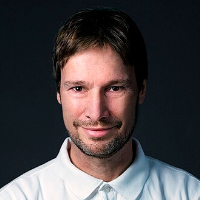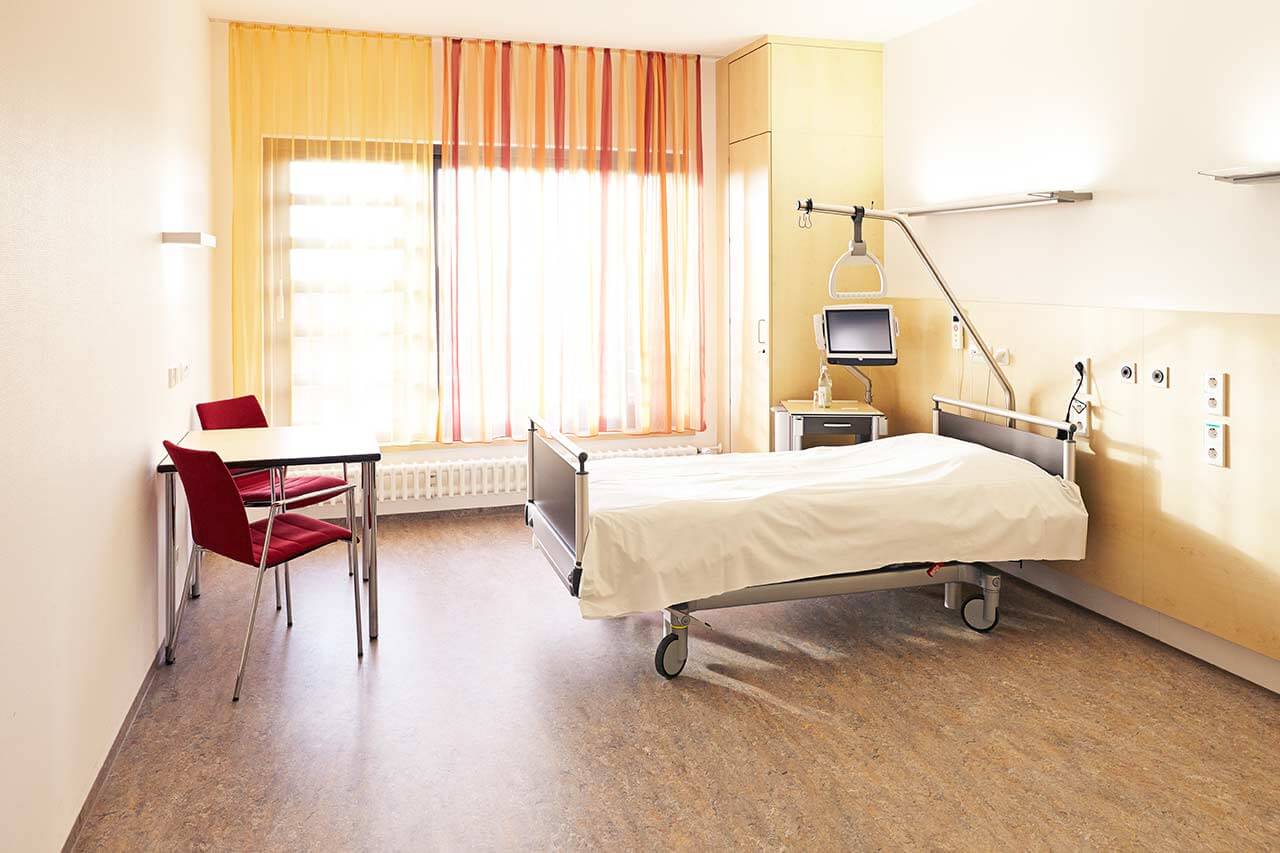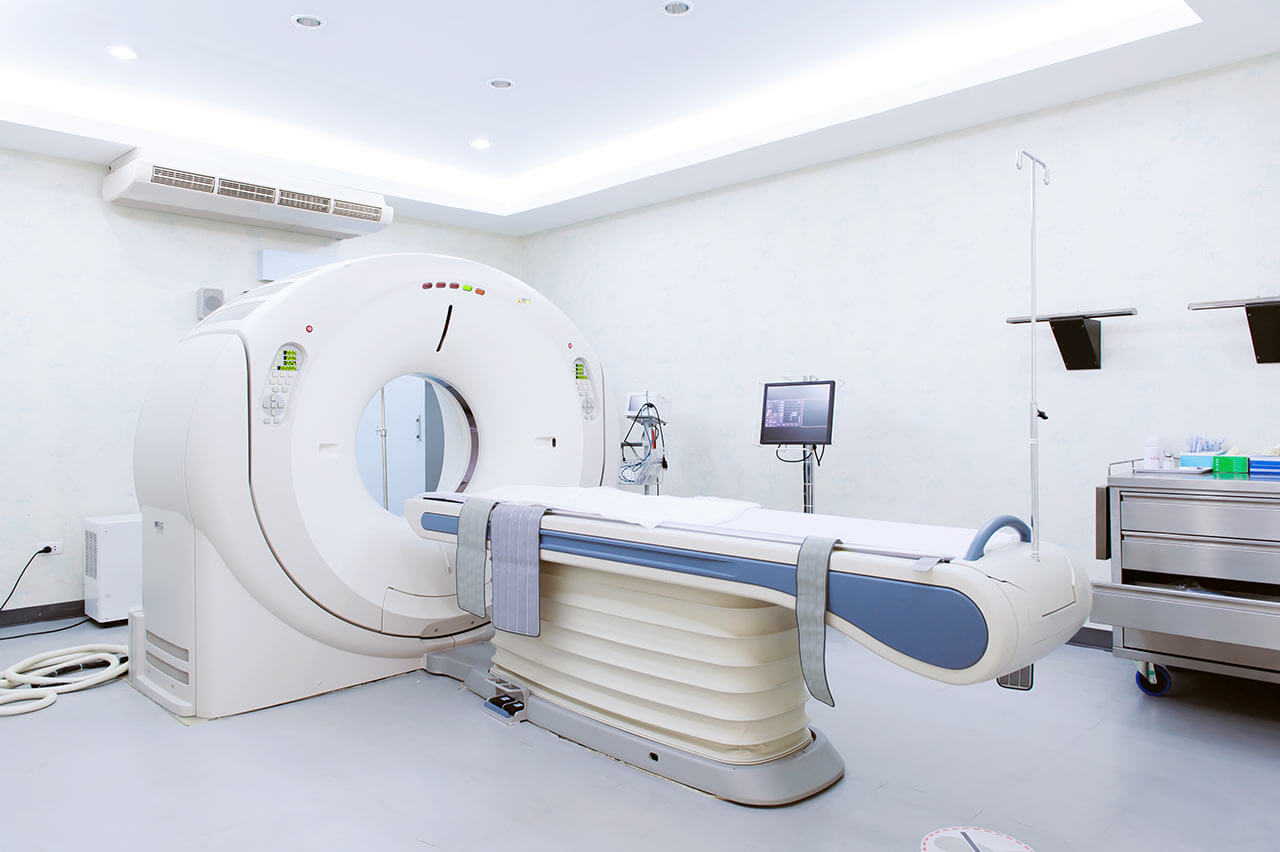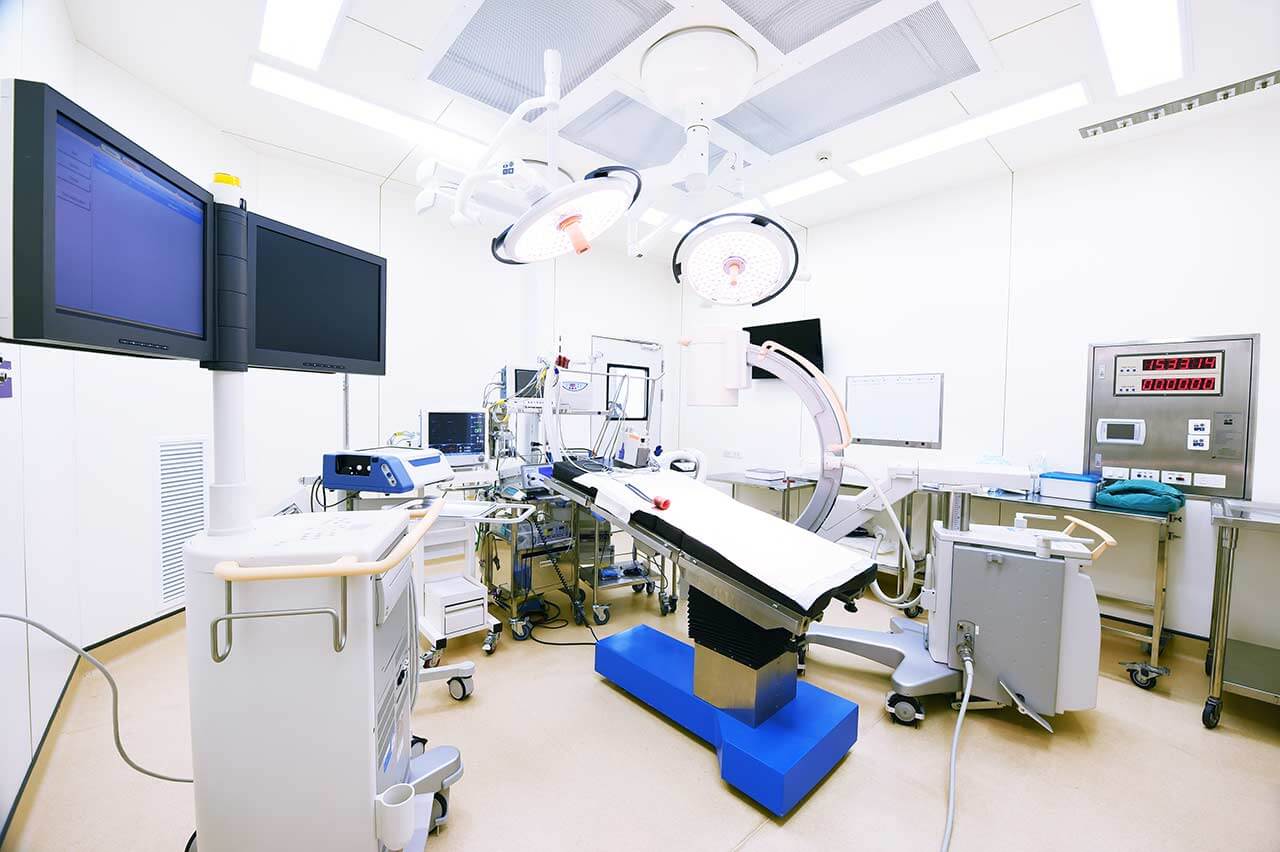
The program includes:
- Initial presentation in the clinic
- clinical history taking
- review of medical records
- physical examination
- general neurological examination
- neuropsychological tests:
- electroneuromyography (ENMG)
- laboratory tests:
- complete blood count
- inflammatory indicators (CRP, ESR)
- indicators of blood coagulation
- X-ray of spine
- CT scan of spinal cord (on indication 650 €)
- MRI scan of spinal cord (on indication 1200 €)
- nursing services
- consultation of all leading experts
- development of individual treatment plan
- written statement
Required documents
- Medical records
- X-ray examination, MRI/CT scan (if available)
Service
You may also book:
 BookingHealth Price from:
BookingHealth Price from:
About the department
According to the Focus magazine, the Department of Adult and Pediatric Spinal Surgery at the Helios ENDO-Clinic Hamburg ranks among the best medical facilities in Germany in the area of its specialization!
The department provides patients with the full range of diagnostic services and surgical treatment of pathologies of all parts of the spine. The department performs operations of any complexity for various spinal pathologies in adults and children. In most cases, the specialists of the medical facility use advanced minimally invasive and microsurgical techniques, thanks to which patients recover in the shortest possible time. The department's doctors have excellent qualifications in treating spinal tumors and metastases, inflammatory processes and vertebral fractures, repairing spinal deformities (for example, scoliosis and kyphosis), treating spinal injuries, and peripheral nerve compression syndromes. The department is also competent in revision spinal surgery. The clinical activity of the medical facility is certified in accordance with the standards of the German Spine Society.
The Head Physician of the department is PD Dr. med. Ralf Hempelmann. The doctor has vast clinical experience and deep knowledge in the field of his competence. For his outstanding achievements in spinal surgery and scoliosis repair, the doctor was awarded the Leading Medicine Guide Certificate. The specialist was also awarded a Master's Certificate from the German Society for Spine Surgery (DGW). In many years of his clinical practice, the surgeon has already performed more than 5,000 interventions on the spinal cord, spine, and peripheral nerves.
Many patients with spinal disc herniation seek medical attention in the department. The department's medical team successfully treats herniated discs in the cervical, thoracic, and lumbar spine. In the early stages of a hernia, doctors often use only conservative treatment methods that are aimed at eliminating the pain syndrome. If such therapy is ineffective, the specialists then resort to surgery. Surgical treatment involves the use of microsurgical techniques. Minimally invasive laparoscopic techniques are also used whenever possible. Thanks to this modern approach to treatment, the patient's mobilization begins on the evening of the operation, and there is no need for a long stay at the hospital.
Cases of spinal stenosis are quite common in the department. In the early stages, spinal stenosis practically does not cause any symptoms, and therefore, at the time of detection of the disease, conservative treatment methods are ineffective. Consequently, patients with this diagnosis rarely manage to avoid surgery. The department's spinal surgeons most often resort to decompression interventions, the essence of which is to relieve the nerve roots from compression. In some cases, dynamic stabilization systems can also be used during surgery. Spinal stenosis surgery is performed using microsurgical techniques. In addition, surgeons always use an operating microscope. After the operation, a patient is provided with all the necessary therapeutic measures for the rapid restoration of mobility and a return to their usual way of life.
Of particular interest to the department's team of doctors is the repair of spinal deformities, the most common of which are scoliosis and kyphosis, or a combination of these two deformities. Spinal deformities may develop in both adults and children. Non-surgical treatment is provided whenever possible. Patients are usually prescribed to wear a corrective corset, and undergo massage, physiotherapy and other methods. If, after the prolonged use of conservative methods, it is not possible to improve a patient's condition, the attending physician decides on a surgical intervention.
Patients with chronic back pain are offered highly effective interventional procedures: facet joint infiltration and denervation, sacroiliac joint infiltration and denervation, and periradicular therapy. The procedures are performed under the guidance of X-ray or computed tomography, which guarantees high accuracy of injection of painkillers directly into the pathological focus. Interventional pain management can significantly relieve pain in the back for a long period of time. In addition, the therapeutic procedure can be repeated many times.
The department's main clinical activities are as follows:
- Cervical spine surgery
- Surgery for spinal stenosis accompanied by myopathy and cervical disc herniation
- Ventral fusion with the Cage technique or intervertebral disc replacement surgery, dorsal decompression (spondylectomy with the implantation of special plates can also be performed, if required)
- Stabilization surgery for cervical instability
- Correction of cervical deformities (through ventral or dorsal approach)
- Thoracic spine surgery
- Surgical treatment of thoracic spinal stenosis and thoracic disc herniation
- Intervertebral disc replacement surgery through ventral approach
- Kyphoplasty for osteoporotic fractures
- Correction of deformities (scoliosis and kyphosis) through posterior, anterior or combined approach
- Stabilization surgery for thoracic instability and destructive processes
- Lumbar spine surgery
- Minimally invasive and microsurgical operations for lumbar disc herniation
- Implantation of intervertebral disc prostheses, repair of deformities and lumbar instability (instrumental repair and fusion)
- Decompression for spinal stenosis
- Vertebral body prosthetic repair through ventral approach
- Repair of deformities (scoliosis and kyphosis)
- General spinal surgery
- Surgical treatment of spinal deformities (scoliosis, kyphosis and post-traumatic deformities)
- Removal of spinal canal tumors (meningiomas, ependymomas, and neurinomas)
- Spinal cord tumor removal with neuromonitoring
- Surgical treatment of syringomyelia
- Surgical treatment of complications or consequences of surgical interventions in all parts of the spine (revision surgery)
- Surgical removal of spinal metastases
- Surgical treatment of inflammatory spinal diseases
- Treatment of facet syndrome and sacroiliac joint syndrome (infiltratio and denervation)
- Interventional therapy for spinal pathologies (drug infiltration and periradicular therapy)
- Peripheral nerve surgery
- Surgical spinal oncology
- Treatment of peripheral nerve compression syndromes (carpal tunnel syndrome, cubital tunnel syndrome and tarsal tunnel syndrome)
- Conservative therapy for spinal deformities in adolescents (for example, the use of corsets)
- Multimodal pain management
- Other medical services
Curriculum vitae
Higher Education and Postgraduate Training
- 1983 - 1990 Medicine studies at the Christian Albrecht University of Kiel.
- 1987 Internship in Tropical and Internal Medicine, Ophthalmology and Surgery, Sane Guruji Hospital, Pune, India.
- 1988 Internship in Internal Medicine, Farnborough Hospital, Kent, England.
- 1988 Internship in Obstetrics, Pediatrics, Surgery and Traumatology, Nazareth Hospital, Israel.
- 03.12.1990 The third state examination at the Christian Albrecht University of Kiel.
- 1990 Thesis defense.
- 2003 Habilitation, Christian Albrecht University of Kiel.
Professional Career
- 1991 - 1992 Internship, Department of Neurology, University Hospital Kiel.
- 1992 - 1994 Research Fellow, Institute of Pharmacology at the Christian Albrecht University of Kiel.
- 1994 - 2002 Assistant Physician and Research Fellow, Department of Neurosurgery, University Hospital Kiel.
- 1997 Research Fellow, Department of Anesthesiology, Mayo Clinic, Rochester, USA.
- 2002 - 2006 Senior Physician, Department of Neurosurgery, City Hospital Dessau.
- 2006 - 2010 Managing Senior Physician and Deputy Head Physician, City Hospital Dessau.
- Since 2010 Head Physician of the Department of Adult and Pediatric Spinal Surgery at the Helios ENDO-Clinic Hamburg.
Grants
- 1986 - 1990 Grant, German Academic Scholarship Foundation.
- 1997 and 1998 Research Grant from the German Research Foundation.
- 2000 Research Grant from the Research Center for Integrative Neuroscience at the University Hospital Kiel.
Certificates
- 2011 "Spinal Neurosurgery" Certificate from the German Society of Neurosurgery.
- Basic certificate from the German Society for Spine Surgery.
- 1991 Certificate from the German Society of Ultrasound in Medicine (DEGUM): transcranial Doppler and duplex sonography.
- 1999 Certificate from the German Society of Ultrasound in Medicine (DEGUM): combined Doppler and duplex sonography of the arteries supplying the brain.
- 2004 Theoretical foundations of the specialty in Radiation Protection.
Teaching Career
- Lectures on Neurosurgery, Martin Luther University Halle-Wittenberg.
Photo of the doctor: (c) Helios ENDO-Klinik Hamburg
About hospital
According to the prestigious Focus magazine, the Helios ENDO-Clinic Hamburg ranks among the top German clinics specializing in orthopedic rehabilitation, spinal surgery, and hip surgery!
The clinic is one of the largest and most famous orthopedic medical facilities in the world. Performing more than 9,000 joint surgeries and treating more than 9,000 patients every year, the clinic positions itself as a leading healthcare facility for joint replacement surgery not only in Germany, but throughout Europe. The clinic also enjoys an excellent reputation for the surgical treatment of spinal diseases. The medical complex was founded in 1976 and its doctors have been successfully conducting their clinical practice for over 45 years, offering patients a unique clinical experience and effective treatment methods. At the same time, the clinic has a friendly and pleasant atmosphere in which patients feel as comfortable as possible.
Despite the huge popularity and high treatment success rates, the department's specialists continue to perform productive research activities to improve surgical methods and endoprosthesis models, as well as to develop innovative therapeutic methods.
The health of patients is in the safe hands of a large and competent team of highly specialized doctors, nurses, and physiotherapists, working hand in hand to ensure the best therapeutic results. At the same time, due attention is paid to a respectful attitude towards each patient and to a detailed analysis of each clinical case. The main task of the doctors is to provide each patient with an effective treatment adapted to their individual needs and to give them the joy of movement without pain.
The department's doctors have in their arsenal many sparing minimally invasive and arthroscopic techniques that ensure access to the pathological focus through several small skin incisions. Due to this, the length of hospital stay is significantly reduced, the severity of pain in the postoperative period is reduced, and the risks of complications are almost zero. On the day of the operation, a patient will be able to get out of bed on their own and take the first steps, after which the stage of mobility restoration begins.
The clinic regularly admits foreign patients from different parts of the world. This is the best confirmation of the high level of medical care and the success of therapy.
Photo: (с) depositphotos
Accommodation in hospital
Patients rooms
The patients of the Helios ENDO-Clinic Hamburg live in modern single and double rooms with all the conveniences. Each patient room has an ensuite bathroom with a toilet and a shower. The patient rooms are designed in bright colors and feature large windows that offer a pleasant view of the street. The standard patient room includes an automatically adjustable bed, a bedside table, a wardrobe with lockable compartments, a TV, a radio, and a telephone, as well as a table and chairs for receiving visitors. The floors and furniture in the patient rooms are made of natural wood. The bed is equipped with a special nurse call system, which can also be used to control the TV, radio, and turn lights on or off in the room. The clinic also offers access to Wi-Fi, which can be used for an additional fee.
Meals and Menus
The clinic provides three tasty and varied meals per day to its patients: a buffet breakfast, a three-course dinner, and a light dinner. The menu always features vegetarian dishes. Also, on request, patients may be provided with an individual menu. Tea or coffee of your choice is served at each meal.
In addition, the clinic has a cozy ENDO'ro cafe, where one can have a tasty snack or drink hot and cold drinks.
Further details
Standard rooms include:
Accompanying person
Your accompanying person may stay with you in your patient room or at the hotel of your choice during the inpatient program.
Hotel
You may stay at the hotel of your choice during the outpatient program. Our managers will support you for selecting the best option.





